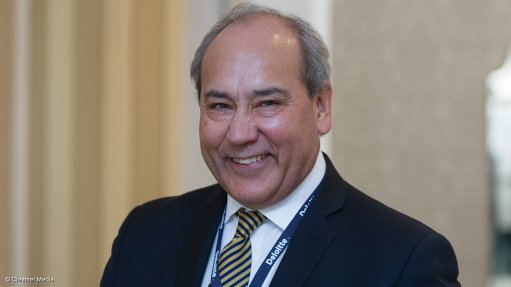
ANTONY HARWOOD Fear of the other could become fear of the robot
Photo by: Duane Daws
JOHANNESBURG (miningweekly.com) – Despite positive sentiment and improving commodity prices, the African mining industry continues to face immense challenges, says Montero Mining and Exploration CEO Dr Antony Harwood.
Addressing the African Mining Network’s (AMN’s) thirty-ninth networking dinner, on Thursday evening, he touched on the rapid development of new technologies such as robotics, blockchain and artificial intelligence, and how trends toward optimisation and cost reduction are driving their adoption, ultimately impacting on job retention and creation.
He said companies will continually look to automate mining, because of the benefits in terms of productivity, and in reducing incidents and company liability.
“People aren’t meant to work in cramped, dark and dangerous spaces – much as I enjoy being down there – so mining is increasingly becoming more mechanised.”
Harwood suggested, however, that the increased automation of the industry, combined with the large mineral reserves and the effects of a growing and predominantly youthful African population, could create massive employment challenges in future.
He noted that, because of the abundance of mineral reserves, mining is always going to be seen as as key economic sector and employer in Africa.
He added that xenophobia is often an unreasonable response to unemployment, and inferred that the irrational response could extend to technology and mine mechanisation, if the challenges surrounding unemployment are not addressed.
“Fear of the other could become fear of the robot.”
He also urged mining companies to determine whether profit for profit’s sake was their aim, and how to reconcile profitability and productivity with societal challenges such as unemployment and poverty, particularly in African countries.
Harwood noted that political changes and increased nationalistic focus had seen a resurgence in companies exploring assets “at home”. He pointed to the resurgence of the US mining sector, and its seemingly benefitting from the reduced “red tape” proposed by the current administration.
Further, he pointed to African countries and their citizens becoming “tired of being exploited” and becoming distrustful of international mining companies and the degree of financial value they provide to their host nations.
He suggested that mining and exploration companies could do more to be “good guests” and said they should, at the very least, explain how their operations will benefit the mining-affected communities.
He further suggested that mining companies looking to mine in Africa should investigate opportunities for beneficiation.
Meanwhile, Harwood also touched on the dearth of infrastructure in African countries and how it impacted on investment in mineral exploration and development, as companies had to consider costs pertaining to electricity and transport.
However, he stressed that many countries had seen vast improvements in infrastructure developments, and noted that the geology was usually good enough to negate the additional costs associated with site establishment.
Harwood noted that, despite global threats such as financial crashes or threats of war, or the challenges posed by the political and economic situations in African countries, there are still many opportunities for companies and governments to prosper.
AMN’s next event will be held on April 12, and will feature platinum miner Anglo American Platinum CEO Chris Griffith as guest speaker.